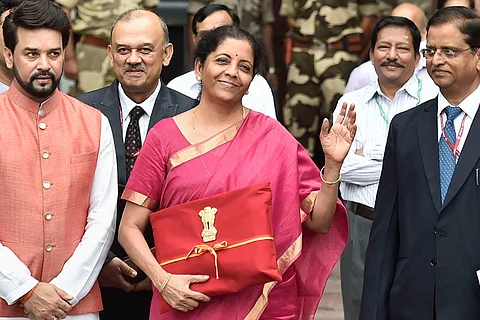

In a bid to further incentivise e-mobility, Finance Minister (FM) Nirmala Sitharaman on Friday announced in her budget speech that customs duty is being exempted on certain parts of electric vehicles. In order to incentivise purchase of electric vehicle by an individual, it is proposed to provide deduction of an amount upto Rs. 1,50,000 for interest paid on loan taken for purchase of electric vehicle. The loan is required to be taken on or before March 31, 2023, she said.
The FM said, “Considering our large consumer base, we aim to leapfrog and envision India as a global hub of manufacturing of Electric Vehicles. Inclusion of Solar storage batteries and charging infrastructure in the above scheme will boost our efforts. Government has already moved GST council to lower the GST rate on electric vehicles from 12% to 5%. Also to make electric vehicle affordable to consumers, our government will provide additional income tax deduction of Rs 1.5 lakh on the interest paid on loans taken to purchase electric vehicles. This amounts to a benefit of around Rs 2.5 lakh over the loan period to the taxpayers who take loans to purchase electric vehicles.”
Reacting to the development, Vivekanada H.R., CEO and Co-Founder, Bounce, said, “This is a ‘start-up positive’ and ‘pro-mobility’ budget with greater emphasis on job creation, cleaner transportation, holistic connectivity, and funding towards R&D. The government's agenda is clearly to empower the common man with environmental-friendly transportation and seamless connectivity. The continued focus on EV adoption through FAME II, provision towards charging infrastructure, reduction of GST and I-T deduction will be a game changer. This budget is a boost for mobility players like Bounce to make stronger and faster inroads into EV. The proposed e-verification mechanism to make the angel funding process hassle-free is a welcome initiative. Additionally, the funding towards R&D will help propel the country’s technology ecosystem and pave way for innovation-led growth."
The FM added that Phase-II of FAME Scheme, following approval of the Cabinet with an outlay of Rs 10,000 crore for a period of 3 years, has commenced from April 1, 2019. The main objective of the Scheme is to encourage faster adoption of electric vehicles by way of offering upfront incentives on purchase of electric vehicles and also by establishing the necessary charging infrastructure for electric vehicles. Advanced battery and registered e-vehicles will be incentivised under the Scheme with greater emphasis on providing affordable and environment-friendly public transportation options for the common man, she added.
FAME was launched by the Ministry of Heavy Industries and Public Enterprises in 2015 to incentivise the production and promotion of eco-friendly vehicles including electric vehicles and hybrid vehicles. FAME India is part of the National Electric Mobility Mission Plan.
Ola CEO Bhavish Agarwal also had words of praise for the budget.
“The Government’s focus on Electric Mobility and EVs in the Budget 2019 is inspiring. Lower GST rate, interest subvention for EV loans and the commitment of Rs. 10,000 cr towards FAME 2 are encouraging. This further reinforces Ola’s mission to build Electric Mobility for India and the world and contribute toward making our nation, the global hub for innovation in this space. The various startup friendly initiatives announced as part of the budget are important for this fast growing ecosystem and will encourage India’s youth to create value, wealth and livelihood opportunities for millions. The thrust on digital payments will further accelerate the nation towards a transparent and cashless economy.”
Very inspiring to see #Budget2019 by @nsitharaman @FinMinIndia focus on Electric Mobility, Digital Payments and the growing Startup Ecosystem. We’re excited about being part of this journey and in contributing to India becoming an innovation hub and leading the world by example.
— Bhavish Aggarwal (@bhash) July 5, 2019
In order to boost economic growth and Make in India, the government will launch a scheme to invite global companies through a transparent competitive bidding to set up mega-manufacturing plants in sunrise and advanced technology areas such as Semi-conductor Fabrication (FAB), Solar Photo Voltaic cells, Lithium storage batteries, Solar electric charging infrastructure, etc. and provide them investment linked income tax exemptions under section 35 AD of the Income Tax Act, and other indirect tax benefits, the FM said.
Tarun Mehta, CEO & Cofounder, Ather Energy said, "Government has already moved GST Council to lower GST on EVs from 12% to 5% and the additional income tax reduction is a major boost for end consumers to purchase EVs. It addresses the concern of the upfront cost of purchasing electric vehicles. This is the best example of a consumer driven change and is also how Ather envisions the EV sector to achieve scale and growth. It now becomes imperative that OEMs chalk out plans that allows the industry to scale up and meet the demand for compelling products."
The budget announced by the Finance Minister for 2019-20 will catalyse India’s journey to electrification and will be beneficial for both, the e-mobility industry as well as consumers who are looking to make the shift to electric vehicles, said Parveen Kharb, CEO and Co-Founder, 22KYMCO. "The budget has a strong synergy with the FAME – II scheme and the announcement will generate a positive sentiment. Lowering GST rates on electric vehicles to 5% will make EVs more attractive to the buyer in the future. In addition, incentives on income tax will also increase the momentum for the sector. We welcome the new budget and trust that this will encourage faster adoption of e-mobility in India,” he added.